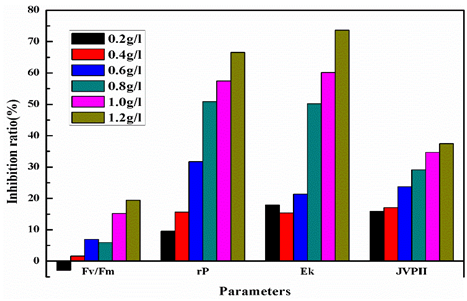A research team led by ZHAO Nanjing with Anhui Institute of Optics Fine Mechanics under Hefei Institutes of Physical Science releazed a new approach to detect water biological toxicity based on the inhibition effect of algae photosynthesis.
In ecotoxicology, how long the toxicity evaluation take and how sensitive it is matter as key factors. Therefore, there is a trend to develop a way to obtain the evaluation results quickly and sensitively.
In fact, biological toxicity monitoring method based on the photosynthetic activity parameters of algae removes bottleneck of the traditional "algal growth inhibition test" toxicity detection method, which is limited by the cell cycle and has a long measurement cycle. It possesses advantages of quick response, rich parameters and simple measurement, and is considered as a potential approach for rapid monitoring and early warning of water pollution toxicity.
In their work this time, chlorophyll fluorescence was used as the probe of algal photosynthesis process to carry out the photosynthetic inhibition test of Chlorella pyrenoidosa in 72 hours and 70 minutes under the acute toxicity of phenol, and to study the response law of various photosynthetic activity parameters of algae under different toxicity intensity.
The results showed that the acute toxicity of phenol had a significant inhibitory effect on the photosynthetic activity parameters Fv/Fm, rP, α, Ek, and JVPII, and the toxicity effect could be stable within 5 minutes.
Their work may provide a new method to detect water biological toxicity, ecotoxicological research and rapid detection of toxic substances.
The research work was supported by the National Key Research and Development Plan of China, the National Natural Science Foundation of China and the Anhui Province Excellent Youth Science Foundation of China.
Link to the paper: Response of Photosynthetic Activity Parameters of Algae Under Phenol Stress

Response of photosynthetic activity parameters to phenol stress at different concentrations for 5 min (Image by YIN Gaofang)
Contact:
ZHOU Shu
Hefei Institutes of Physical Science (http://english.hf.cas.cn/)
Email: zhous@hfcas.ac.cn
 Tel: +86-551-65591206
Tel: +86-551-65591206
 Fax: +86-551-65591270
Fax: +86-551-65591270
 Emai: zhous@hfcas.ac.cn
Emai: zhous@hfcas.ac.cn
 350 Shushanhu Road
350 Shushanhu Road